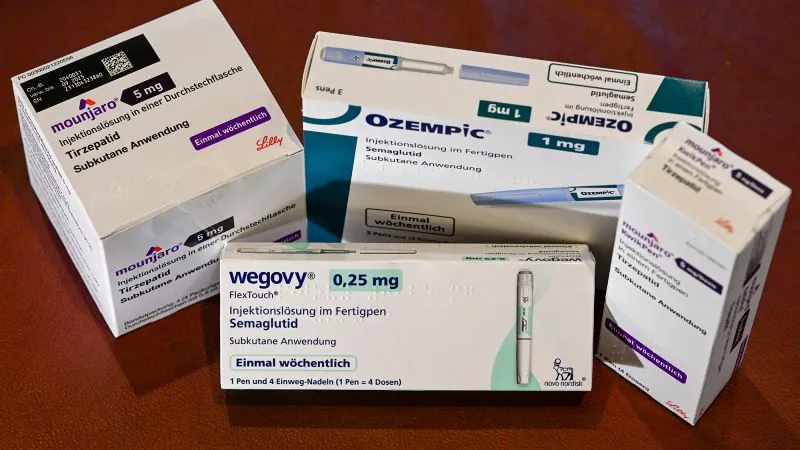
Do GLP-1 Weight Loss Drugs Affect Your Mood? Experts Reveal the Surprising Truth!
2024-09-19
As weight loss medications like semaglutide (Wegovy) and tirzepatide (Zepbound) gain popularity, users are increasingly raising concerns about potential mood changes, including heightened feelings of anxiety and depression. This has led to scrutiny from the U.S. Food and Drug Administration (FDA), which has launched an investigation into these side effects. But what does science say?
These medications, originally designed to help manage type 2 diabetes (sold as Ozempic and Mounjaro), have made a notable transition into the weight loss market. While a report published in September 2023 in JAMA Internal Medicine indicates that there are "no clinically meaningful differences" in mental health scores between users of semaglutide and non-users, the situation is more complex, with experts suggesting that the effects of GLP-1 drugs on mood can vary widely depending on individual circumstances.
The Mood-Medication Connection
Dr. Davide Arillotta, a resident at the University of Florence, sheds light on how GLP-1 medications interact with mood-regulating parts of the brain. He asserts that these drugs can release neurotransmitters like dopamine and serotonin—often referred to as "feel-good hormones." This means that for some patients, the medication may alleviate feelings of anxiety or depression.
Conversely, Dr. Amira Guirguis from Swansea University points to the impact of blood sugar regulation on mood. Studies show that fluctuations in blood glucose can lead to irritability and anxiety, particularly in individuals experiencing hypoglycemia. The stress of adhering to dietary changes imposed by these medications can also lead to feelings of deprivation that affect mental health.
Body Image and Mental Health
Dr. Guirguis highlights another critical factor: the psychological ramifications of weight loss. While dropping pounds may boost confidence for some, for others, it may trigger issues like body dysmorphic disorder—leading to increased anxiety and depressive symptoms. The pressure to maintain weight loss can create feelings of vulnerability and create a cycle of harmful behaviors, such as restrictive dieting.
Dr. Thomas Wadden, a prominent obesity researcher at the University of Pennsylvania, emphasizes that the relationship with food may serve as a coping mechanism for people who have experienced trauma. For these individuals, the drastic changes in their body image and lifestyle could lead to an identity crisis of sorts, plunging them into feelings of insecurity rather than empowerment.
Navigating Mood Changes
So how can users of GLP-1 medications protect their mental health? Nutrition experts recommend taking a strategic approach to eating. Regular meals with balanced nutrition can help stabilize blood sugar levels, mitigate mood swings, and prevent the negative impacts of undernourishment. Exercise and adequate sleep are also crucial in maintaining psychological wellness.
It's vital for anyone starting these medications to discuss their mental health history with a healthcare provider. Even those without a prior history of mental health issues should remain vigilant about mood changes and seek support from health professionals if needed.
Final Thoughts: Don't Go It Alone!
Whether battling emotional highs and lows or considering going on GLP-1 drugs for weight loss, the key takeaway is clear: proactive management of both physical and mental health is essential. Social support systems, from healthcare teams to online communities, can be invaluable during this journey. Always remember, navigating the weight loss landscape does not have to be a solo endeavor—seek help and stay informed!
In a world where the pursuit of a healthy body can sometimes come at a psychological cost, staying educated and aware is your best defense. If you or someone you know is experiencing severe mood changes, don't hesitate to reach out to a mental health professional for guidance and support.



 Brasil (PT)
Brasil (PT)
 Canada (EN)
Canada (EN)
 Chile (ES)
Chile (ES)
 España (ES)
España (ES)
 France (FR)
France (FR)
 Hong Kong (EN)
Hong Kong (EN)
 Italia (IT)
Italia (IT)
 日本 (JA)
日本 (JA)
 Magyarország (HU)
Magyarország (HU)
 Norge (NO)
Norge (NO)
 Polska (PL)
Polska (PL)
 Schweiz (DE)
Schweiz (DE)
 Singapore (EN)
Singapore (EN)
 Sverige (SV)
Sverige (SV)
 Suomi (FI)
Suomi (FI)
 Türkiye (TR)
Türkiye (TR)